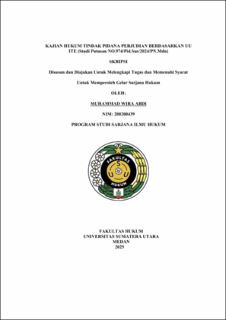| dc.description.abstract | Gambling has long been regarded as a socially and economically harmful act due to its element of chance, which often causes public concern. As information technology advances, gambling has also evolved into the digital realm, making online gambling more widespread and increasingly difficult to monitor. This research examines the criminal act of gambling from a legal perspective, specifically through the framework of the Law on Electronic Information and Transactions (ITE Law). The formulation of the research problems includes: (1) What are the legal regulations regarding criminal acts of gambling based on positive law in Indonesia? (2) How is criminal liability imposed on perpetrators of online gambling crimes? (3) How is the criminal law applied in online gambling based on the case study of Decision No. 974/Pid.Sus/2024/PN.Mdn?
The method used in this thesis is normative juridical research, with a descriptive nature and a statutory approach. The data utilized is primarily secondary data, collected through literature study, and analyzed using qualitative methods. The research also adopts a case study approach based on the relevant court decision.
Gambling as a criminal offense has generally been regulated under various positive legal frameworks in Indonesia, including the Indonesian Criminal Code (KUHP), Law No. 7 of 1974, Government Regulation No. 9 of 1981, and more specifically, the Electronic Information and Transactions Law (ITE Law), which governs electronic content containing gambling elements through Article 27 paragraph (2) and Article 45 paragraph (2). Furthermore, the criminal liability of online gambling offenders includes how the elements of the offense are proven and linked to the principles of legality and evidentiary rules in criminal law. The application of the law in Decision No. 974/Pid.Sus/2024/PN.Mdn demonstrates that the panel of judges found the defendant legally and convincingly guilty of committing an online gambling crime by using electronic devices to access the gambling site “Raja Mahjong.” In the analysis of this ruling, it is evident that the judges considered the normative legal elements, electronic evidence, and the defendant’s confession in imposing a sentence of 1 year and 6 months imprisonment. This indicates that Indonesia’s positive law provides a strong foundation for law enforcement against online gambling | en_US |


